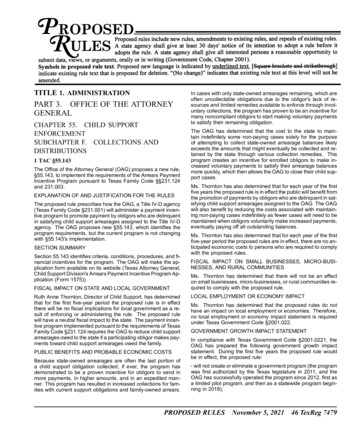
Transcription
TITLE 1. ADMINISTRATIONPART 3. OFFICE OF THE ATTORNEYGENERALCHAPTER 55. CHILD SUPPORTENFORCEMENTSUBCHAPTER F. COLLECTIONS ANDDISTRIBUTIONS1 TAC §55.143The Office of the Attorney General (OAG) proposes a new rule,§55.143, to implement the requirements of the Arrears PaymentIncentive Program pursuant to Texas Family Code §§231.124and 231.003.EXPLANATION OF AND JUSTIFICATION FOR THE RULESThe proposed rule prescribes how the OAG, a Title IV-D agency(Texas Family Code §231.001) will administer a payment incentive program to promote payment by obligors who are delinquentin satisfying child support arrearages assigned to the Title IV-Dagency. The OAG proposes new §55.143, which identifies theprogram requirements, but the current program is not changingwith §55.143's implementation.SECTION SUMMARYSection 55.143 identifies criteria, conditions, procedures, and financial incentives for the program. The OAG will make the application form available on its website (Texas Attorney General,Child Support Division's Arrears Payment Incentive Program Application (Form 1575)).FISCAL IMPACT ON STATE AND LOCAL GOVERNMENTRuth Anne Thornton, Director of Child Support, has determinedthat for the first five-year period the proposed rule is in effectthere will be no fiscal implications for local government as a result of enforcing or administering the rule. The proposed rulewill have a neutral fiscal impact to the state. The payment incentive program implemented pursuant to the requirements of TexasFamily Code §231.124 requires the OAG to reduce child supportarrearages owed to the state if a participating obligor makes payments toward child support arrearages owed the family.PUBLIC BENEFITS AND PROBABLE ECONOMIC COSTSBecause state-owned arrearages are often the last portion ofa child support obligation collected, if ever, the program hasdemonstrated to be a proven incentive for obligors to send inmore payments, in higher amounts, and in an expedited manner. This program has resulted in increased collections for families with current support obligations and family-owned arrears.In cases with only state-owned arrearages remaining, which areoften uncollectable obligations due to the obligor's lack of resources and limited remedies available to enforce through involuntary collections, the program has proven to be an incentive formany noncompliant obligors to start making voluntary paymentsto satisfy their remaining obligation.The OAG has determined that the cost to the state to maintain indefinitely some non-paying cases solely for the purposeof attempting to collect state-owned arrearage balances likelyexceeds the amounts that might eventually be collected and retained by the state through various collection remedies. Thisprogram creates an incentive for enrolled obligors to make increased voluntary payments to satisfy their arrearage balancesmore quickly, which then allows the OAG to close their child support cases.Ms. Thornton has also determined that for each year of the firstfive years the proposed rule is in effect the public will benefit fromthe promotion of payments by obligors who are delinquent in satisfying child support arrearages assigned to the OAG. The OAGwill also benefit by reducing the costs associated with maintaining non-paying cases indefinitely as fewer cases will need to bemaintained when obligors voluntarily make increased payments,eventually paying off all outstanding balances.Ms. Thornton has also determined that for each year of the firstfive-year period the proposed rules are in effect, there are no anticipated economic costs to persons who are required to complywith the proposed rules.FISCAL IMPACT ON SMALL BUSINESSES, MICRO-BUSINESSES, AND RURAL COMMUNITIESMs. Thornton has determined that there will not be an effecton small businesses, micro-businesses, or rural communities required to comply with the proposed rule.LOCAL EMPLOYMENT OR ECONOMY IMPACTMs. Thornton has determined that the proposed rules do nothave an impact on local employment or economies. Therefore,no local employment or economy impact statement is requiredunder Texas Government Code §2001.022.GOVERNMENT GROWTH IMPACT STATEMENTIn compliance with Texas Government Code §2001.0221, theOAG has prepared the following government growth impactstatement. During the first five years the proposed rule wouldbe in effect, the proposed rule:- will not create or eliminate a government program (the programwas first authorized by the Texas legislature in 2011, and theOAG has successfully operated the program since 2012, first asa limited pilot program, and then as a statewide program beginning in 2018);PROPOSED RULES November 5, 202146 TexReg 7479
- will not require the creation of new employee positions or theelimination of existing employee positions;(b) The following criteria must be met for an obligor to beeligible to participate in the program:- will not require an increase or decrease in future legislativeappropriations to the agency;(1) there must be a final Texas child support order in theobligor's case;- will not require an increase or decrease in fees paid to theagency.(2) the obligor must have and maintain a current addresson record with the Title IV-D agency;- will create one new regulation;(3) there must be at least 500 in both state-owned arrears (child support assigned to the state under Texas Family Code§231.104(a) that accrued during any month the obligee receivedTANF/AFDC public assistance benefits) and unrecovered assistance(the amount of money paid in the form of public assistance under theTitle IV-A program that has not yet been recovered from collectionsapplied to state owned arrears for the case);- will not expand, limit, or repeal an existing regulation;- will not increase or decrease the number of individuals subjectto the rule's applicability; and- will not positively or adversely affect this state's economy.TAKINGS IMPACT ASSESSMENTThe OAG has determined that no private real property interestsare affected by the proposed rules and the proposed rules donot restrict, limit, or impose a burden on an owner's rights tohis or her private real property that would otherwise exist in theabsence of government action. As a result, the proposed rulesdo not constitute a taking or require a takings impact assessmentunder Texas Government Code §2007.043.PUBLIC COMMENTFor 30 days following the publication of this rule, the OAGwill accept public comments regarding the review. Commentsare due on Monday, December 6, 2021, by 5:00 p.m. CST.Comments should be directed to Rebecca Foster, DeputyDivision Chief, Child Support Legal Services, Child SupportDivision, Office of the Attorney General, (physical address)5500 East Oltorf, Austin, Texas 78741 or (mailing address)P.O. Box 12017, Mail Code 044, Austin, Texas 78711-2017,CSD-Tex-Admin-Code@oag.texas.gov .The proposed rule is authorized under Texas Family Code§231.124(a), which provides the OAG with the authority to promulgate rules to administer a payment incentive program. Theproposed rule implements the requirements of Texas FamilyCode §231.124.STATUTORY AUTHORITY. OAG proposes new 1 TAC §55.143under Texas Family Code §§231.003 and 231.124. Section231.003 authorizes a Title IV-D agency to promulgate procedures by rule for the implementation of Chapter 231. Section231.124 provides that the OAG may establish and administera payment incentive program to promote payment by obligorswho are delinquent in satisfying child support arrearages.Cross-reference to Statute. New §55.143 implements an incentive program to promote payment of child support arrearages aspermitted by Texas Family Code §231.124.§55.143. Arrears Payment Incentive Program.(a) The Arrears Payment Incentive Program is a voluntary program administered by the Title IV-D agency to promote payment byobligors who are delinquent in satisfying child support arrearages assigned to the Title IV-D agency under Texas Family Code §231.104(a).The program is established pursuant to Texas Family Code §231.124.The program provides to a participating obligor a credit satisfying childsupport arrearages assigned to the Title IV-D agency for every dollaramount paid by the obligor on interest and arrearages balances duringeach month of the obligor's voluntary enrollment in the program. Participation by an obligor in the program does not prohibit the Title IV-Dagency from pursuing any other collection method authorized by law.46 TexReg 7480November 5, 2021Texas Register(4) the child support obligation must not be payable to theDepartment of Family and Protective Services;(5) the obligor must not have a pending bankruptcy case;(6) the obligor's case must not be one in which the TitleIV-D agency is providing intergovernmental services under TexasFamily Code Chapter 159; and(7) the obligor must not be currently incarcerated.(c) The following conditions apply to an obligor's continuedparticipation in the program:(1) to receive program matching payment credits reducingstate-owned arrears, an obligor must pay the current support obligations for the month in full, including medical and dental support, ifany, plus make a payment toward the child support arrears balance;(2) an obligor must make at least one qualifying arrearagepayment within any 180-day period for continued participation in theprogram. Failure by an obligor to make at least one qualifying arrearage payment within any 180-day period may result in the Title IV-Dagency removing the obligor from the program;(3) payments must be voluntarily paid by the obligor or bythe obligor's employer through income withholding; and(4) if an obligor enrolled in the program seeks federal bankruptcy protection, the obligor shall no longer be eligible to receive program matching payment credits and shall be removed from the programwhile the bankruptcy proceeding is pending.(d) The following procedures apply to enrollment in the program:(1) the Office of the Attorney General will make the TexasAttorney General, Child Support Division's Arrears Payment IncentiveProgram Application (Form 1575) available on its website;(2) if an obligor has multiple cases and wants each caseenrolled in the program, the obligor will need to apply to the programfor each case;(3) obligors may apply for initial enrollment in the programregardless of whether they are currently making payments on their case;(4) if the obligor is removed from the program, there is asix-month waiting period to be eligible to re-apply; and(5) an obligor may be immediately eligible for re-enrollment if a lump sum payment equaling at least three full months ofsupport obligations, including any periodic court-ordered arrears payments, is paid through the Texas Child Support State DisbursementUnit.
(e) The following terms apply to the financial incentives to beoffered under the program:(1) if the obligor pays all current support obligations for themonth, any additional amounts paid towards the child support arrearswill be matched with a dollar for dollar credit that will be applied toreduce state-owned child support arrears. Program matching creditswill not be applied to reduce medical support or dental support arrears.Program matching payment credits will not reduce any family-ownedarrears;(2) an obligor is eligible to earn program matching payment credits from the date of acceptance into the program;(3) program matching payment credits automatically stoponce unrecovered assistance is paid in full or state-owned child supportarrears are paid in full, whichever occurs first; and(4) payments received on other cases involving the obligeemay impact the portion of arrears on the obligor's case that are eligiblefor matching payment credits.(f) The following payments are not eligible for programmatching payment credits:(1)federal offsets;Section 56 of Senate Bill 703, 87th Texas Legislature, RegularSession (2021), among other things, repealed Chapter 42, TexasAgriculture Code, which created the Food and Fibers ResearchGrant Program. As a result of the repeal of Chapter 42, TexasAgriculture Code, rules for the Food and Fibers Research GrantProgram are no longer necessary.LOCAL EMPLOYMENT IMPACT STATEMENT: The Departmenthas determined that the proposed repeals will not affect a localeconomy, so the Department is not required to prepare a localemployment impact statement under Texas Government Code,§2001.022.GOVERNMENT GROWTH IMPACT STATEMENT: Pursuant toTexas Government Code, §2001.0221, the Department providesthe following Government Growth Impact Statement for the proposed repeals. For each year of the first five years the proposedrepeals will be in effect, the Department has determined the following:1. the proposed repeals do not create or eliminate a governmentprogram;2. implementation of the proposed repeals does not require thecreation or elimination of employee positions;3. implementation of the proposed repeals does not require anincrease or decrease in future legislative appropriations to theDepartment;(2) state debt setoffs;(3)lottery intercepts;(4)bond forfeitures;(5)monies received as the result of child support liens orlevies; or4. the proposed repeals do not require an increase or decreasein fees paid to the Department;5. the proposed repeals do not create a new regulation;(6) payments made directly to the obligee and not throughthe Texas Child Support State Disbursement Unit.The agency certifies that legal counsel has reviewed the proposal and found it to be within the state agency's legal authorityto adopt.Filed with the Office of the Secretary of State on October 21,2021.TRD-202104248Austin KinghornGeneral CounselOffice of the Attorney GeneralEarliest possible date of adoption: December 5, 2021For further information, please call: (512) 460-6673 TITLE 4. AGRICULTUREPART 1. TEXAS DEPARTMENT OFAGRICULTURECHAPTER 1. GENERAL PROCEDURESSUBCHAPTER N. FOOD AND FIBERSRESEARCH GRANT PROGRAM RULES4 TAC §§1.920 - 1.928The Texas Department of Agriculture (Department) proposes therepeal of 4 Texas Administrative Code, Chapter 1, SubchapterN, regarding Food and Fibers Research Grant Program Rules,§§1.920 - 1.928.6. the proposed repeals will repeal an existing regulation;7. the proposed repeals do not increase or decrease the numberof individuals subject to the rule's applicability; and8. the proposed repeals do not positively or adversely affect thisstate's economy.FISCAL IMPACT ON STATE AND LOCAL GOVERNMENT:Mindy Weth Fryer, Director for Contracts and Grants, has determined that for each year of the first five years the proposedrepeals are in effect, enforcing or administering the proposedrepeals does not have foreseeable implications relating to costsor revenues of state or local governments.PUBLIC BENEFITS AND PROBABLE ECONOMIC COST: Ms.Fryer has determined that for each year of the first five-year period the proposed repeals are in effect, the public benefit will bethe elimination of rules that will no longer be administered by theDepartment. Ms. Fryer has also determined that for each yearof the first five-year period the proposed repeals are in effect,there will be no cost to persons who are required to comply withthe proposed repeals.FISCAL IMPACT ON SMALL BUSINESSES, MICRO-BUSINESSES, AND RURAL COMMUNITIES: The Department hasdetermined there will be no adverse economic effect on smallbusinesses, micro-businesses, or rural communities as a resultof the proposed repeals, therefore preparation of an economicimpact statement and a regulatory flexibility analysis, as detailedunder Texas Government Code, §2006.002, are not required.Comments on the proposed repeals may be submitted to SkylerShafer, Assistant General Counsel, P.O. Box 12847, Austin,Texas 78711, or by email to skyler.shafer@texasagriculture.gov.PROPOSED RULES November 5, 202146 TexReg 7481
The deadline for comments is 30 days after publication in theTexas Register.The repeals are proposed under Section 12.016 of the TexasAgriculture Code, which provides that the Department may adoptrules as necessary for the administration of its powers and dutiesunder the Code. No other sections are affected by these repeals.§1.920. Definitions.§1.921. Purpose.§1.922. Administration.§1.923. Council.§1.924. Council Meetings.§1.925. Primary Research Areas.§1.926. Proposal Submission.§1.927. Proposal Review and Selection.§1.928. Reporting Requirements.The agency certifies that legal counsel has reviewed the proposal and found it to be within the state agency's legal authorityto adopt.Filed with the Office of the Secretary of State on October 21,2021.TRD-202104242Skyler ShaferAssistant General CounselTexas Department of AgricultureEarliest possible date of adoption: December 5, 2021For further information, please call: (512) 936-9360 FISCAL NOTEENTRY REQUIREMENTS4 TAC §§51.5, 51.10, 51.16The Texas Animal Health Commission proposes amendments toTitle 4, Texas Administrative Code, Chapter 51 titled "Entry Requirements". Specifically, amendments are proposed to §51.5concerning Movement of Quarantined Animals, and §51.10,concerning Cervidae. The Texas Animal Health Commissionproposes the addition of §51.16, concerning Enforcement andPenalties.The proposed amendments to §51.5 update the reference from§161.061 of the Texas Agriculture Code to §45.3 of the TexasAdministrative Code in accordance with Senate Bill 705 enactedby the Texas Legislature during the 87th Regular Session. Senate Bill 705 amended §161.041 and §161.061 of the Texas Agriculture Code, and now requires the commission to adopt ruleslisting the diseases that require control or eradication. The commission adopted amendments to Chapter 45, titled "Reportableand Actionable Diseases", in a duly noticed meeting on September 21, 2021. The proposed amendments to §51.5 also clarifythe Executive Director's approval is required for each consignment of animals moving to slaughter or to a quarantined feedlot for those animals affected with or recently exposed to an46 TexReg 7482November 5, 2021In §51.10, concerning Cervidae, amendments are proposed tosubsections (a) and (b) to control and reduce the incidence ofCWD entering Texas, as well as provide clearer guidelines ofentry requirements for CWD susceptible species. CWD is a degenerative and fatal neurological communicable disease recognized by the veterinary profession that affects susceptible cervidspecies. CWD can spread through natural movements of infected animals and transportation of live infected animals or carcass parts. Specifically, prions are shed from infected animalsin saliva, urine, blood, soft-antler material, feces, or from animaldecomposition, which ultimately contaminates the environmentin which CWD susceptible species live. CWD has a long incubation period, so animals infected with CWD may not exhibit clinicalsigns of the disease for months or years after infection. The disease can be passed through contaminated environmental conditions, and may persist for a long period of time. Currently, novaccine or treatment for CWD exists. Grammatical and editorialchanges are also proposed for improved readability and consistency. Specifically, certain terms and provisions, such as theaddition of reindeer and caribou, are proposed to be consistentwith Title 4 Texas Administrative Code Chapter 40.The proposed new section, §51.16 concerning Enforcementand Penalties, describes the scope of violations and respectivepenalties as prescribed by Chapter 161 of the Texas AgricultureCode. Subsection (b) provides that administrative penalties maynot exceed 5,000 each day a violation continues or occurs.PART 2. TEXAS ANIMAL HEALTHCOMMISSIONCHAPTER 51.infectious, contagious, or communicable disease or that originate from quarantined herds or flocks. Grammatical and editorialchanges are also proposed for consistency and improved readability. In §51.5(b), poultry and birds are proposed for deletionbecause "animal" encompasses the terms. "Animal" is definedin 4 TAC §51.1 to include livestock, exotic livestock, domesticfowl, and exotic fowl.Texas RegisterMs. Myra Sines, Chief of Staff of the Texas Animal Health Commission, determined for each year of the first five years the rulesare in effect, there will be no additional fiscal implications forstate or local government because of enforcing or administering the proposed rules as commission employees currently allocated to these activities will continue to administer and enforcethese rules as part of their current job duties and resources.PUBLIC BENEFIT NOTEMs. Sines determined that for each year of the first five yearsthe rules are in effect, the anticipated public benefit as a result isupdating the rule to align with the requirement enacted during the87th Regular Legislative Session that the Texas Animal HealthCommission adopt rules listing the diseases that require controlor eradication. As such, the proposed amendments update thereference to the diseases identified in Chapter 45 of the TexasAdministrative Code.The proposed amendments to §51.10(a) and (b) would reducethe risk of CWD entering Texas and clarify entry requirementsfor CWD susceptible species into Texas, which would improveunderstanding of entry permit approval or denial. Additionally,terms are amended for consistency with other chapters in Title 4of the Texas Administrative Code. Further, grammatical and editorial changes are proposed in both sections for improved readability.LOCAL EMPLOYMENT IMPACT STATEMENT
The commission determined that the proposed rules would notimpact local economies and, therefore, did not file a request fora local employment impact statement with the Texas WorkforceCommission pursuant to Texas Government Code §2001.022.MAJOR ENVIRONMENTAL RULEThe commission determined that Texas Government Code§2001.0225 does not apply to the proposed amendments because the specific intent of these rules is not primarily to protectthe environment or reduce risks to human health from environmental exposure and, therefore, is not a major environmentalrule.TAKINGS ASSESSMENTThe commission determined that the proposal does not restrict,limit, or impose a burden on an owner's right to his or her privatereal property that would otherwise exist in the absence of government action. Instead, the proposed rules in part relate to thehandling of animals, including requirements concerning movement, pursuant to 4 TAC §59.7. As such, the activities under theproposed amendments do not constitute a takings and do notrequire a Takings Assessment pursuant to Texas GovernmentCode §2007.043.ECONOMIC IMPACT STATEMENT AND REGULATORY FLEXIBILITY ANALYSISThe commission determined that because the proposed ruleswould not result in any direct economic effect on any small business, microbusiness, or rural community, neither the economicimpact statement nor the regulatory flexibility analysis describedin Texas Government Code, Chapter 2006, is required.Although the commission does not predict adverse economic impacts to those directly regulated by the commission in Texas,the commission reviewed 97 permit requests in 2020 from 46out-of-state consignors. As such, the commission consideredalternatives to proposing the 25-mile radius requirement for entry. The commission considered proposing no action, halting allinterstate movements, implementing a radius of 15 or 25 miles,and a radius of 25 miles unless otherwise epidemiologically determined by the Executive Director. Based on the recent discoveries of CWD in free-ranging, captive and herds certified in anApproved State CWD Herd Certification Program in Texas andother states, as well as the varying degree of disease response,testing and surveillance conducted by other states, the commission found the 25-mile radius with the flexibility for the Executive Director to epidemiologically evaluate entry requests on acase-by-case basis, necessary to protect the health of Texas'CWD susceptible species and prevent adverse economic impacts associated with Chronic Wasting Disease.GOVERNMENT GROWTH IMPACT STATEMENTIn compliance with the requirements of Texas GovernmentCode §2001.0221, the commission prepared the followingGovernment Growth Impact Statement (GGIS). For each yearof the first five years the proposed rules would be in effect, thecommission determined the following:1. The proposed rules would not create or eliminate a government program;2. Implementation of the proposed rules would not require thecreation of new employee positions or the elimination of existingemployee positions;3. Implementation of the proposed rules would not require anincrease or decrease in future legislative appropriations to thecommission;4. The proposed rules would not require an increase or decreasein fees paid to the commission;5. The proposed rules would not create a new regulation;6. The proposed rules would expand existing rules and wouldnot otherwise limit or repeal an existing regulation;7. The proposed rules would not increase the number of individuals subject to the regulation; and8. The proposed rules would not adversely affect this state'seconomy.COST TO REGULATED PERSONSThe commission determined that for each year of the first fiveyears in which the proposed rules are in effect, the proposedrules do not impose a direct cost on regulated persons, a stateagency, a special district, or a local government within the state.Therefore, it is not necessary to repeal or amend any other existing rule.REQUEST FOR COMMENTComments regarding the proposed rules may be submitted toAmanda Bernhard, Texas Animal Health Commission, 2105Kramer Lane, Austin, Texas 78758, by fax to (512) 719-0719,or by email to comments@tahc.texas.gov. Comments mustbe received no later than thirty (30) days from the date ofpublication of this proposal in the Texas Register.STATUTORY AUTHORITYThe amendments to Chapter 51 of the Texas AdministrativeCode are proposed pursuant to Chapter 161 of the TexasAgriculture Code.Pursuant to Texas Agriculture Code §161.041, titled "DiseaseControl", the commission shall protect all livestock, exotic livestock, domestic fowl, and exotic fowl from diseases the commission determines require control or eradication. The commissionshall adopt and periodically update rules listing the diseases thatrequire control or eradication by the commission.Pursuant to Texas Agriculture Code §161.046, titled "Rules", thecommission is authorized to adopt rules as necessary for theadministration and enforcement of this chapter.Pursuant to Texas Agriculture Code §161.054, titled "Regulationof Movement of Animals; Exception", the commission may byrule regulation the movement of animals, and may restrict the intrastate movement of animals even though the movement of theanimals is unrestricted in interstate or international commerce.The commission may require testing, vaccination, or anotherepidemiologically sound procedure before or after animals aremoved.Pursuant to Texas Agriculture Code §161.0545, titled "Movement of Animal Products", the commission may adopt rules thatrequire the certification of persons who transport or dispose ofinedible animal products, including carcasses, body parts, andwaste material. The commission by rule may provide terms andconditions for the issuance, renewal, and revocation of a certification.Pursuant to Texas Agriculture Code §161.061, titled "Establishment", the commission may establish a quarantine against allPROPOSED RULES November 5, 202146 TexReg 7483
or the portion of a state, territory, or country in which a diseaselisted in rules adopted under Section 161.041 exists.Pursuant to Texas Agriculture Code §161.081, titled "Importationof Animals", the commission by rule may regulate the movementof livestock, exotic livestock, domestic animals, domestic fowl, orexotic fowl into this state from another state, territory, or country.The commission by rule may provide for the issuance and formof health certificates and entry permits.No other statutes, articles, or codes are affected by this proposal.§51.5. Movement of Quarantined Animals.(a) Animals under a Texas Animal Health Commission [TAHC] quarantine notice. A person shall not move [Theyare restricted from moving] an animal [out] from a quarantined[Quarantined] area unless the movement is authorized by a commission representative [TAHC].(b)Animals entering Texas from quarantined herds, flocks, orareas.(1) An animal [Animals, poultry, or birds] originating ina state or area under quarantine as a result of action taken during ameeting of the commission shall not be moved into Texas except asspecified in the quarantine notice.(2) An animal [Animals, poultry, or birds] affected with orrecently exposed to infectious, contagious, or communicable diseases[disease] and not in an area or state under the commission's quarantineor that originate in quarantined herds or flocks shall not be moved intoTexas unless:(A) the animal is [they are] consigned to slaughter ora quarantined feedlot and [are] accompanied by a VS Form 1-27 permit issued by an accredited veterinarian or regularly employed veterinarians or inspectors of the state of origin or of the United States Department of Agriculture, Animal and Plant Health Inspection Service,Veterinary Services and upon written permission by the Executive Director for each consignment; or(B) upon written permission by the Executive Director[executive director] of the commission for each consignment.(c) Executive Director determination. If the Executive Director determines or is informed that a disease or agent of disease transmission listed in §45.3(a) - (c) of this title (relating to the Reportableand Actionable Disease List) [, listed in §161.061 of Texas AgricultureCode,] exists in another state, territory, or country, and deems [believesthat] it [is] necessary to protect livestock in this state, the Executive Director [executive director] may establish a quarantine against all or theportion of the state, territory, or country in which the disease exists.Any quarantine [Quarantine] issued by the Executive
Division, Officeof the Attorney General, (physical address) 5500 East Oltorf, Austin, Texas 78741 or (mailing address) P.O. Box 12017, Mail Code 044, Austin, Texas 78711-2017, CSD-Tex-Admin-Code@oag.texas.gov . The proposed rule is authorized under Texas Family Code



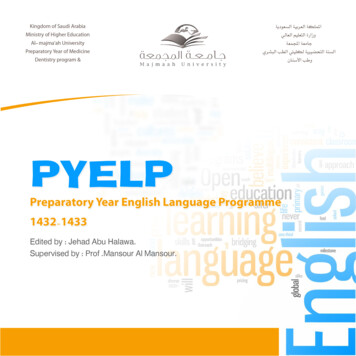
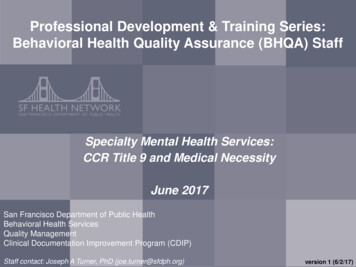
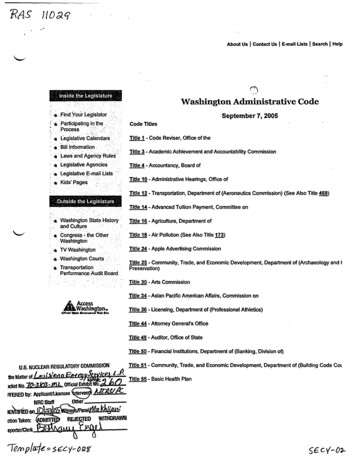
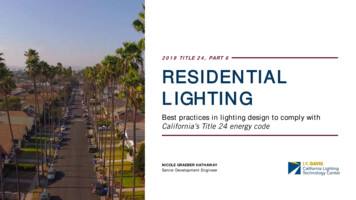

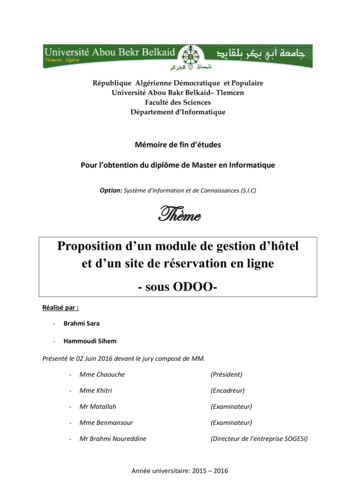

![Office 2010 Professional Plus Com Ativador Serial Keyl [EXCLUSIVE]](/img/61/office-2010-professional-plus-com-ativador-serial-keyl-exclusive.jpg)
